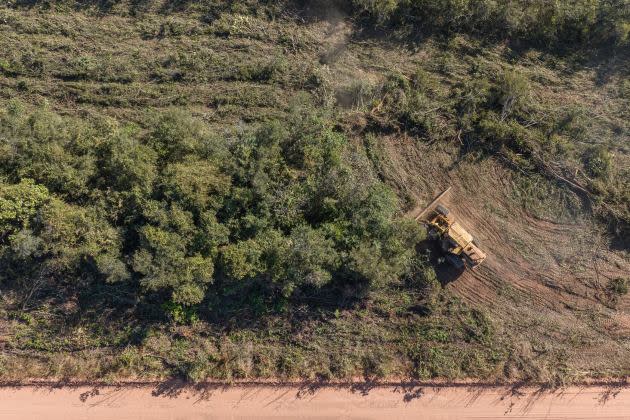H&M, Zara Certifier Better Cotton Linked to Illegal Deforestation in NGO Report

PARIS — Brazilian cotton used by fast-fashion behemoths H&M and Zara has been linked to deforestation and illegal land clearing, according to an investigative report by NGO Earthsight released Thursday.
The cotton was certified as sustainable under the Better Cotton label coming from two producers, SLC Agrícola and Groupo Horita, which are under investigation by both federal and state agencies in Brazil for land grabbing and deforestation. Both groups have been hit with a number of fines for environmental infractions and illegal land clearing since 2008.
More from WWD
Earthsight’s yearlong investigation into the cotton supply chain showed that Brazilian cotton produced by SLC Agrícola and Grupo Horita worked its way to the fast-fashion companies via Asian suppliers.
The NGO examined satellite images, court rulings and shipping records to track 816,000 tons of directly exported cotton from the two growing firms to eight manufacturers that supplied H&M and Zara. Among them were Indonesia’s PT Kahatex, Bangladesh’s Jamuna Group and Pakistan’s Interloop. Earthsight then traced garments from those suppliers to the retailers’ sales floors in the U.S. and Europe.
Both companies responded to the report implicating Better Cotton’s practices.
“We welcome Earthsight’s commitment on these issues and take these allegations extremely seriously. We are in close contact with the Better Cotton certification owner — who has begun a thorough investigation into the specific allegations,” H&M said in a statement. “We remain in close dialogue with BCI and other stakeholders to identify improvement needs for the standard and its verification and welcome the opportunity to continue a dialogue with Earthsight on the same.”
Zara parent company Inditex added: “As sustainability is a work-in-progress, we continuously collaborate with certifying organizations and other specialized third parties to enhance the quality of these standards, their requirements, their traceability tools and compliance policies. We take very seriously any information regarding to improper practices in the textile industry,” it said.
Inditex went further and published a letter it sent to Better Cotton chief executive officer Alan McClay on the Spanish business news site Modaes. It said the allegations in the Earthsight investigation “represent a serious breach in the trust placed in Better Cotton’s certification process by both our group and product suppliers.”
The company asked Better Cotton to clarify its certification process and traceability mechanisms.
“The trust that we place in such processes developed by independent organizations, such as yours, is key to our supply chain control strategy,” the letter said.
H&M and Inditex, parent company of Zara and its sister brands Bershka and Pull&Bear, are Better Cotton’s biggest buyers.
Brazil produces 42 percent of the world’s certified Better Cotton, and is the world’s second largest cotton exporter overall.
The investigation implicates the opacity of fashion’s supply chains, and the industry’s reliance on certifications to meet sustainability targets without direct oversight as materials move through several countries before hitting the shop floor as finished goods.
“It has become very clear that crimes related to the commodities we consume have to be addressed through regulation, not consumer choices. That means lawmakers in consumer countries should put in place strong laws with tough enforcement. In the meantime, shoppers should think twice before buying their next piece of cotton clothing,” said Earthsight director Sam Lawson.
The cotton in question was sourced from Brazil’s Cerrado, a savanna region that has lost 50 percent of its native vegetation since the 1950s to industrial farming. The rate of deforestation has accelerated in recent years, up 43 percent in 2023, according to Brazilian government data.
Regulation, particularly within the EU, aims to fill those gaps but has fallen short so far. The EU’s Corporate Sustainability Due Diligence Directive, which would hold large companies accountable for identifying potential human rights violations and environmental impacts throughout their supply chains, has been put on hold just before it was due for a vote last February.
A significantly weakened version of the legislation is expected to be voted on before the next European elections in June.
The EU’s Deforestation Regulation, which requires traceability to the land where the materials were produced, will come into force later this year, but does not cover cotton.
Best of WWD

 Yahoo Finance
Yahoo Finance 